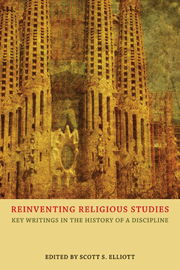Book contents
- Frontmatter
- Contents
- Introduction
- 1 For such a time as this: the Council of Societies for the Study of Religion, 1969–2009
- Part I Inventing and reinventing the field of religious studies
- Part II Method and theory in religious studies
- Part III Teaching religion
- Part IV Women and the bible in religious studies
- Part V Religion and religious studies in civic life
- Part VI Religious studies and identity politics
- 33 Late capitalism arrives on campus: making and remaking the study of religion
- 34 Religious studies and identity politics: mythology in the making
- 35 Toward an engaged religious studies
- 36 The study of religion under late capitalism, or commodity triumphant
- Part VII Islam and 9/11
- Bibliography
- Acknowledgments
- Index
36 - The study of religion under late capitalism, or commodity triumphant
from Part VI - Religious studies and identity politics
- Frontmatter
- Contents
- Introduction
- 1 For such a time as this: the Council of Societies for the Study of Religion, 1969–2009
- Part I Inventing and reinventing the field of religious studies
- Part II Method and theory in religious studies
- Part III Teaching religion
- Part IV Women and the bible in religious studies
- Part V Religion and religious studies in civic life
- Part VI Religious studies and identity politics
- 33 Late capitalism arrives on campus: making and remaking the study of religion
- 34 Religious studies and identity politics: mythology in the making
- 35 Toward an engaged religious studies
- 36 The study of religion under late capitalism, or commodity triumphant
- Part VII Islam and 9/11
- Bibliography
- Acknowledgments
- Index
Summary
What is late capitalism doing on campus and what does its presence have to do with the study of religion? These two questions, originally asked in the context of a session at the annual meeting of the Society for the Scientific Study of Religion entitled “Late Capitalism Arrives on Campus: Making and Remaking the Study of Religion” (Nashville, November 9, 1996), can receive only the most tentative of answers. In any case, I think that it is precisely the uneasy juxtaposition of the two issues in the title of the session that can provide the stimulus for a productive discussion. Given that in the current economic situation labor is bought and sold in ways that are different from those that prevailed only a couple of decades ago, one would expect that the arrangements that are in place in manufacturing and above all in the service sector would be also at work in the kind of labor that seems to be the service par excellence, namely education. Therefore, considering the world within which universities function, the question, it seems to me, should not be “why is teaching treated the way it is treated,” but, rather, “how could it be otherwise?” In two articles published in 1995, Cary Nelson describes a situation in which, paralleling what happens in society at large, the accumulation of academic wealth and prestige, such as they are, is made possible by ever increasing costs, demands of higher productivity from employees, administrative top heaviness, and reliance on graduate students and part-time faculty.
- Type
- Chapter
- Information
- Reinventing Religious StudiesKey Writings in the History of a Discipline, pp. 221 - 227Publisher: Acumen PublishingPrint publication year: 2013



